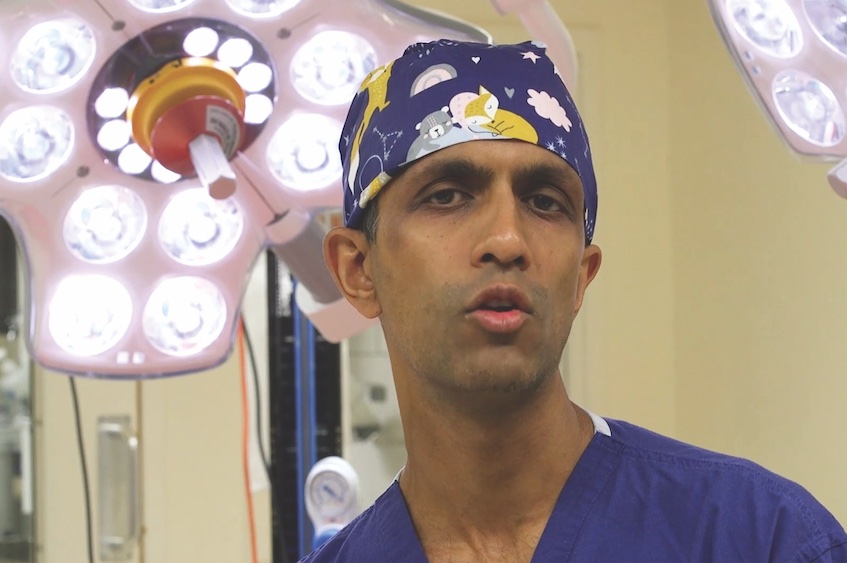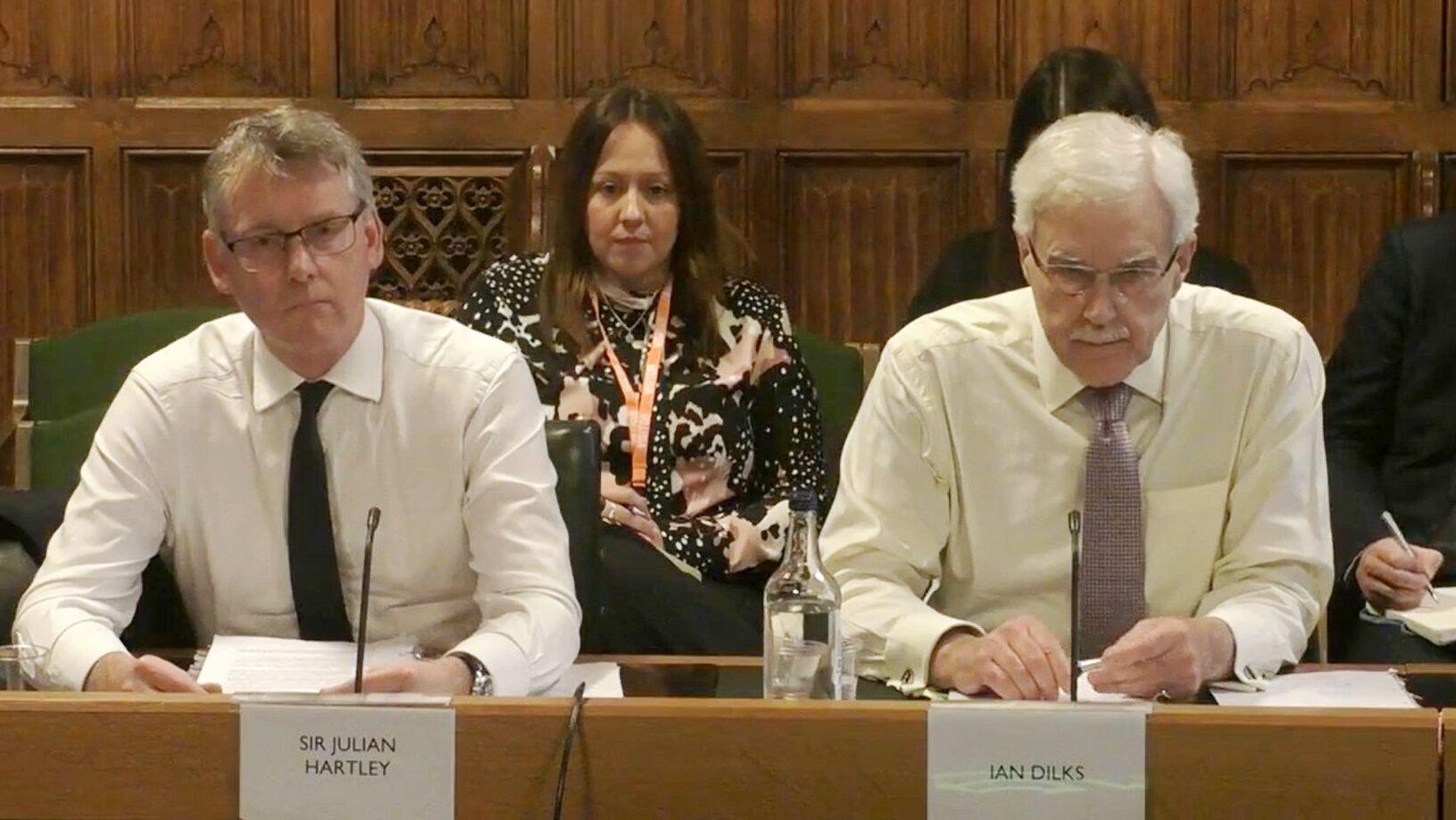From Ground Zero to Net Zero
Decarbonising healthcare will take everything we’ve got and affect everyone working in the NHS. But well-meaning national strategies are struggling to have much impact on the ground. Craig Ryan speaks to pioneering surgeon Aneel Bhangu about the barriers to change and asks why NHS staff and unions aren’t more involved in meeting our greatest long-term challenge.

“I’m not an environmentalist, I’m a pragmatist,” says Aneel Bhangu (pictured), consultant colorectal surgeon at University Hospitals Birmingham (UHB) and, by his own admission, an unlikely champion of a green NHS. “Every hospital has its enthusiast, but I’m trying to appeal to the everyday member of staff, the everyday manager, the everyday surgeon. I want to support people who don’t necessarily know what to do, but know they want to do something.”
In May 2022, Bhangu and his UHB colleagues carried out the world’s first documented carbon net zero operation at the trust’s Solihull hospital (see below). Working with researchers from the University of Birmingham, they examined every aspect of surgical procedure and found ways to reduce the carbon footprint of a single operation by around 80%, bringing emissions down to levels that were viable to offset.
It was arduous and complex work, involving dozens of staff. “I’d looked into the research, and I realised no one knew what to do,” Banghu explains. “This was an experience-based learning situation for me. I learned all the barriers around waste management and behavioural change, and I learned that there isn’t a simple solution. And I learned that it requires everyone to be involved: frontline teams, industry and hospital management.”
He also learned the hard way that net zero and carbon accounting is something of a “dark art”, he says. “It depends where you start and stop measuring and how much ‘truth’ you’re willing to accept.” As an example, he points to the five bags of waste the team set aside for recycling after the Solihull operation, which would normally have been burned. “I can’t say I’m entirely sure what happened to those five bags,” he admits.
Despite last year’s success, the experiment has yet to repeated at Birmingham, let alone rolled out across the NHS. “When I do talks on this, people often look for this neat story: I did one operation, I’ve scaled it across the hospital, now you can do the same,” Bhangu says. “The reality is that that just doesn’t exist.”
Everyone’s on the same side
Meeting NHS England’s target of eliminating the NHS’s vast carbon footprint – around 5% of all UK emissions – by 2045 will be fiendishly complicated. As well as its own treatment and care services, 62% of the NHS carbon footprint comes from a complex supply chain that extends into almost every area of economic activity, from food, drugs and medical devices to transport, data storage and land use. And all this has to be done without compromising patient safety and within the funding straitjacket imposed by tightening budgets, elective recovery and ever rising demand.
To bring all this together, the NHS needs staff at levels and from all professions and jobs to get involved. But engaging with staff or their union representatives doesn’t feature prominently in the strategies published so far by trusts and ICBs. NHS England’s overarching strategy, 2020’s Delivering a Net Zero NHS, only refers to partnership in the context of clinical professional bodies.
“Pretty much everyone is on the same side,” says Michelle Singleton, UNISON’s policy officer for climate change. “The challenge has been grasped at a high level – the NHS has fantastic aspirations. But a lot’s being demanded and it strikes me that you need as many willing hands to that pump as possible.”
Following a mandate from the union’s 2022 conference, Singleton is working to set up a network of ‘green reps’ in all UNISON branches. Working alongside other branch officials, UNISON green reps will have a key role, the union says, in raising awareness of environmental issues, promoting UNISON’s green campaigns, negotiating net zero policies with employers and holding them to account for meeting decarbonisation targets. Basic training is now on offer, aimed at awareness raising and explaining why net zero is a workplace issue.
Involving staff in transformative change
Singleton warns that the NHS’s focus on high level strategies and top-down targets is failing to “recognise the opportunities” for involving staff and their unions. Co-production, she says, is the key to both delivering both the net zero targets and a ‘just transition’ – ensuring that burden of change doesn’t fall disproportionally on the lowest paid staff or the most disadvantaged communities.
“NHS organisations recognise they need a person or even a team that’s responsible for this, but they don’t seem to recognise that they need to involve staff as a whole,” she says. “We’ve done a lot of work on the improvements and savings that come when people on the frontline are involved in transformative change. They can tell you the barriers to change or ideas that they know could work. The people doing policy and strategy won’t have that detailed knowledge,” she explains. “They need to champion ideas coming from staff, including administrators and managers as well as clinical staff”.
It makes sense: if you want to decarbonise surgery, you need to talk to surgeons – working ones, not former surgeons doing policy for NHS England – but also anaesthetists, nurses and the healthcare assistants doing the pre-op and post-op care. If you’re going decarbonise the supply chain, you need to be talking to procurement managers, as well as the staff using the equipment and supplies on the frontline. And so on. But, by and large this doesn’t seem to be happening.
Focus on bite-sized things
Bhangu says he now fields calls from sustainability managers “most days”, and many just don’t know where to start. “What I say to managers is to focus on the bite-sized things that your teams can do, and empower them to achieve them.” Laying down rules and setting targets won’t work, he warns: “If you tell everyone to conserve energy during an operation, theatre teams won’t understand that. It’s not frontline led, so don’t go there.”
The operating theatre is good place to start, he says, because it’s a “controlled environment” where you can introduce change one operation and one patient at a time. “If you can’t make something work in the operating theatre, you cannot make it work in the wider hospital,” he explains. “For example, if you can’t decarbonise theatre waste management, you shouldn’t try it on your wards, because wards are scattered, difficult environments.”
Banghu’s experience with surgical waste management illustrates how managers and frontline staff need to work together. “With recycling and sterilisation contracts, your head of procurement and your head of estates need to be involved in that,” he says. “And it’s difficult: there isn’t a single NHS trust that’s managed to sort that out hospital wide.”
At the same time, there’s the “frontline change”, things like turning off lights and machines, and changing how teams actually dispose of waste. “At the moment, the culture in the NHS is to put everything in those orange bins which get taken away and burnt,” Banghu explains. “And that’s because people are worried about being told off.”
That culture needs to change, he says. “But you can’t solve one without the other; you have to solve what’s going on in the hospital executive with the contracts and what’s happening to waste on the frontline. Hopefully, in the next two or three years, those changes will meet in the middle.”
Green champions
Crucial to rolling out the experiment across the trust, he says, will be teams of “green champions” – frontline staff who feel passionately about net zero surgery and can provide the leadership needed. “There will be an anaesthetist who’s interested, there will be a theatre matron who’s interested, and there will probably be a surgeon in almost every speciality who’s interested,” Bhangu explains. “And managers need to get into a room with them and harness that energy.”
It’s important, he adds, that green champions should not be environmental experts with existing day-to-day responsibilities for net zero policies; neither should they be forced into the regular hospital-wide sustainability group, which tends to “very managerial” and heavily focused on things like estates and procurement, he says.
Green champions are still at an embryonic stage, he admits, and the biggest barrier is lack of knowledge and training, especially among the the trainees and junior consultants who are most enthusiastic about change. In its 2020 net zero strategy, NHS England identified the need for for staff “to be supported to learn, innovate and embed sustainable development into everyday actions”, but three years on, Bhangu notes, the necessary training packages still don’t exist. “We absolutely need to create them,” he says.
A survey of UNISON members by the University of Leeds last year found that only 7% had received any training on decarbonisation and only 18% said staff in their workplace had been consulted about net zero polices affecting them. One very clear message from that survey was that members didn’t feel ready for working in a low-carbon world and felt an urgent need to update their skills.
Give us the tools
This disconnection between high-level policy and aspirations, and their practical application on the ground in NHS organisations, is already familiar from other policy areas like equality and diversity.
“There isn’t much direction coming from NHS England, to be honest,” says Beauty Dhlamini, UNISON’s national officer with responsibility for negotiating net zero policies in health. “They have lovely policies, but there’s no clear way of operationalising them. People struggle to see the connection between green stuff and healthcare, so if it doesn’t come from the bottom up, it’s going to be met with indifference or even resistance. You have to first understand the jobs that people do.”
Despite the formidable barriers, a year on from Solihull’s groundbreaking operation Bhangu has lost none of his enthusiasm. After the experiment, “all these behaviours stopped and things went back to the status quo” he says. “So it’s not just about knowing what to do, it’s about knowing how to persuade teams to do it every single day. That’s quite hard, that’s behavioural change science.”
Bhangu and his university colleagues are now seeking funding for a national research programme looking at how we can scale net zero surgery across the NHS. “Five years from now, things will be different, but we need to develop the tools to get there,” he says.
And his message to managers is that they have crucial role to play: “Theatre teams can do nothing without effective management. They need leaders, they need time and resources to develop [net zero surgery]. And it needs to be a cross-disciplinary effort. Managers need to put together a whole group of people who can work across all specialties. That will deliver the change we need in the NHS.”
- If you’re interested in becoming a union green rep in your workplace, contact UNISON’s policy officer Michelle Singleton (m.singleton@unison.co.uk). To share your own experiences with implementing net zero policies in the NHS, email the editor, Craig Ryan (c.ryan@miphealth.org.uk).
Solihull’s sustainable surgery: the world’s first net zero operation
Only around 5% of hospital inpatients undergo surgery but operating theatres account for 25% of a typical hospital’s carbon emissions. So the first documented net zero operation, carried out in May 2022 at Solihull Hospital, part of the University Hospitals Birmingham trust (UHB), is an important milestone on the road to decarbonising healthcare.
In carrying out the operation, a keyhole procedure to remove a bowel cancer, the team led by consultant surgeon Aneel Bhangu, made several significant changes to usual practices. These included wearing reusable surgical clothing, giving anaesthetics intravenously rather than with gases, minimising electricity usage, recycling single-use equipment, paper and plastic waste, and using individually packed equipment which was only opened when needed. To reduce associated transport emissions, one surgeon jogged to the hospital while the other cycled.
Planning and carrying out the operation involved all members of the surgical and care team, including surgeons, anaesthetists, nurses, cleaners, porters and managers. The hospital said patient safety was “fully maintained throughout” and the operation was performed as part of a full day-long list that included normal surgery for three other patients. Surgeons discussed the experiment beforehand with the patient, who gave separate consent for taking part.
Using a carbon output calculator, specially developed by experts at the University of Birmingham led by Dr Dmitri Nepogodiev, the team estimated that carbon output was reduced by 80%, with the remaining emissions offset by a number of verified offsetting projects, including planting trees in the hospital garden.
“This is only the beginning”, said James Glasbey, research fellow at the University of Birmingham. “We want to do a study across the NHS to engage theatre teams to understand why there are barriers to making theatres greener, and to ensure that patient safety is maintained during those processes.”
- Watch UHB’s video on the groundbreaking net zero operation on You Tube.
Related News
-

Regulating the managers: more questions than answers
The Labour government’s plans for regulating NHS managers are still shrouded in mystery, and the three options on the table each have their pros and cons. Rhys McKenzie weighs up the choices and gauges the views of MiP members on the best way forward.
-

The inspector falls: why the CQC needs a fresh start
After years of chaos, the Care Quality Commission urgently needs to rebuild trust and credibility with the public and the services it regulates. What needs to change and what are the priorities for new boss Sir Julian Hartley? Alison Moore reports.
-

Voice, value and vision: what analysts need from the NHS
Data analysts play a vital role in an NHS which is increasingly data-driven and focused on public health trends. But the NHS faces fierce competition for skilled analysts and many feel the health service fails to value them or fully use their talents. Alison Moore reports.
